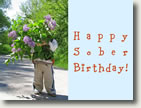Love and Drugs
I have come that you may have life and have it abundantly.
—John 10:10b
He is 40 years old. He is very bright. He has been drinking and “drugging” for many years. Until very recently I had never seen him sober. He is most engaging and lots of relatives and friends enjoy his company, only to end up feeling used.
They say that an addict only turns to others for help with their substance abuse problem when they have run out of ways and means to continue the habit. They have to hit a brick wall. They have to have run out of options.
This man, whom we shall call Hank, reminds me of my older brother, a man who at the age of 33 agreed to go into a residential rehabilitation facility in California. Until then my brother “Ron” had spent thirteen years on heroin after his service in the Korean war, during which he learned to enjoy marijuana. In those years he had lied, stolen, served time on a chain gang—all as a result of his addictions.
It was when he was living in New York City and had run out of money that he hit his brick wall. No friends or relatives (including me) believed him any longer when he asked for money for this or that made-up reason. He had been evicted from his apartment; he had nothing and nowhere to go. He finally agreed to accept professional help.
Back to Hank. He also hit his brick wall in New York City, recently. When he came home, he had used up all friends and relatives. The most he could get from them was a list of local rehab facilities. He surprised them by seeking out and being accepted into a place that might help him—residential, thirty days. He stayed the whole time, did well and came out sober and determined—or so it seemed. Within a week he was back to the bottle and who knows what else.
My point in telling you the stories of these two is that I believe that if they knew that God truly is their Creator—their Heavenly Parent—and truly loves them unconditionally, their lives might have been different and better. When we know we are loved, that we are considered special, that we are cherished without conditions or limitations, we are more likely to respect and love ourselves, as God tells us to love ourselves.
When we doubt that we are loved, we question our worth, and are more likely to do self-destructive, self-hating things. If we open our hearts and minds to the blanket of love surrounding us, that love can act as a shield against self-destruction as well.
Gracious and loving God, be with me and in me, nurture me with your affection and open my heart to accept you and know your love. Amen.
Copyright © 2006 William A. Kolb.
